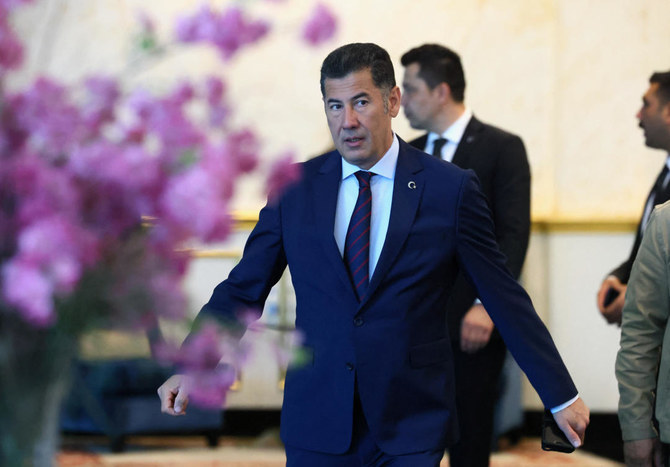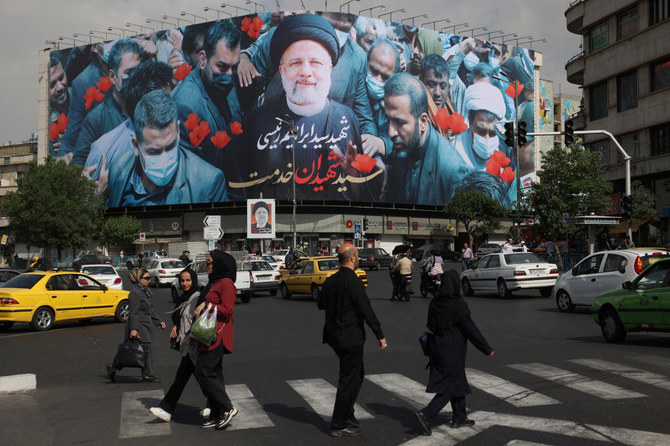ISTANBUL: A little-known nationalist who helped push Turkiye’s election to a runoff told AFP on Tuesday he could throw his support behind either President Recep Tayyip Erdogan or his secular rival.
Entering the campaign at the last minute, Sinan Ogan, 55, won 5.2 percent of the vote in Sunday’s landmark election, helping deprive Erdogan of a first-round victory for the first time in his 20-year rule.
Erdogan finished with 49.5 percent while Kemal Kilicdaroglu secured 44.9 percent, a disappointing finish after polls suggested the opposition leader could win.
In an interview with AFP, Ogan said he expected to do even better, voicing hopes that he could be elected president one day.
“I expected even more — around 10-11 percent of the vote,” said Ogan, a secular nationalist who was expelled from a far-right party that has since joined Erdogan’s ruling alliance in parliament.
Opinion
This section contains relevant reference points, placed in (Opinion field)
Running as an independent, Ogan said he was open to dialogue but may take a few days to make up his mind about who — if anyone — to endorse.
“A decision will be made after talks with both Mr. Erdogan and Mr. Kilicdaroglu,” he said.
“We may say we don’t support either of them.”
A Turkish official told AFP that Erdogan’s Islamic-rooted party will soon make a statement about possible talks with Ogan.
Ogan, who speaks English and studied in a top Moscow university, said his voters included “Turkish nationalists as well as young people who find us more intellectual and who are fed up with the old faces in politics.”
Matt Gertken, chief political strategist at BCA Research, suggested that Ogan mostly took votes away from Erdogan, whose base is comprised of nationalists and religious conservatives.
“In the second round, Erdogan will not necessarily win the majority of Ogan’s votes, but only one-fifth of those votes would grant him the presidency, other things being equal,” Gertken said.
Ogan entered parliament as a member of the ultranationalist MHP party in 2011.
He fell out with the party’s leadership after criticizing the MHP’s poor performance in 2015 polls.
Ogan was expelled from the party but then readmitted after winning a court battle.
Two years later, he was expelled again for opposing a 2017 constitutional referendum that expanded Erdogan’s presidential powers.
Ogan came under pressure to drop out of the race after a fourth candidate, the nationalist Muharrem Ince, ended his campaign just four days before the election.
Asked if he was ready to make up with Erdogan after feuding with his coalition allies, Ogan said: “There can be no room for resentment, if you aspire to rule the state.”
Ogan said anyone he supports must firmly renounce “terrorism” — the term Turkish politicians use to refer to banned Kurdish militants who have been fighting for greater autonomy.
He has reservations about Kilicdaroglu’s ties with the pro-Kurdish HDP party, which endorsed the opposition leader’s candidacy last month.
But he also opposes Erdogan’s alliance with Huda-Par, a far-right group with links to the Kurdish Hezbollah movement, which has no ties to the Lebanese group of the same name.
“We want an approach taken against all kinds of terrorist organizations,” he said, urging political parties to “distance themselves from terror.”
The HDP party is facing a possible court ban over its alleged ties to the Kurdistan Workers’ Party (PKK), listed as a terrorist organization by Ankara and its Western allies.
“I am against any organization that does not distance itself from terrorism,” he said.

























